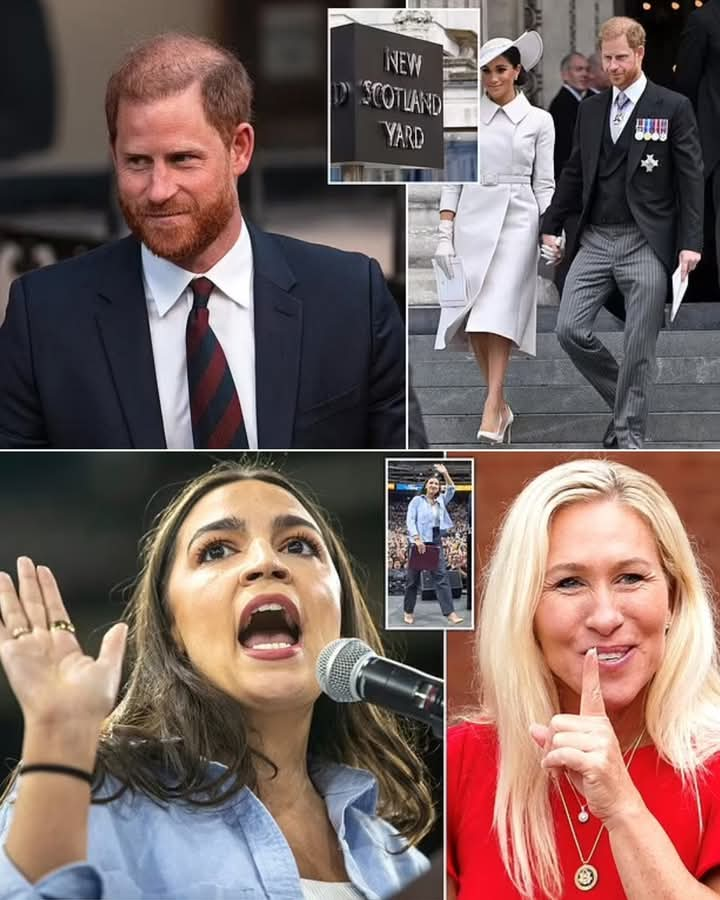CELEBRITY
“Complete nonsense”? A former Scotland Yard chief has slammed Prince Harry’s claim that his police protection was pulled to pressure him and Meghan into staying in the UK. But is there more to this royal security drama than meets the eye? Behind the scenes, conflicting agendas and buried truths may tell a different story… READ MORE BELOW

Complete Nonsense”? The Royal Security Drama Behind Prince Harry’s Explosive Claims
When Prince Harry claimed his police protection was deliberately pulled to pressure him and Meghan Markle into remaining in the UK, the response from some quarters was swift and scathing. One former Scotland Yard chief reportedly called the allegations “complete nonsense.” But is it really that simple? Or is there a deeper, more tangled web of agendas, power struggles, and unspoken tensions behind the scenes of this royal security controversy?
The Royal Exit and the Fallout
Prince Harry and Meghan Markle’s decision to step back from royal duties in 2020, famously dubbed “Megxit,” marked a turning point in the modern royal narrative. Alongside the media frenzy and public debate, one particularly contentious issue emerged: the removal of their UK police protection.
For Harry, the removal of security wasn’t just a procedural change it was a personal affront and a potential threat. He’s since launched legal action against the UK government, arguing he and his family are still at significant risk and that the decision was both unjust and politically motivated. In his version of events, pulling security may have been used as leverage, a way to “strong-arm” the couple into staying within the royal fold.
The Pushback: “Nonsense” or Necessary?
The former Scotland Yard chief’s blunt dismissal of Harry’s claim as “complete nonsense” was hardly unexpected. From the establishment’s perspective, royal security is not a bargaining chip it’s a resource-heavy operation governed by protocols, risk assessments, and precedent. Once Harry and Meghan stepped back from being working royals, they no longer qualified for taxpayer-funded police protection, they argue.
But critics say this view may be a convenient deflection. After all, other non-working royals have received protection in the past, and the lines around entitlement aren’t always so clear-cut. Harry was born into the spotlight, served in Afghanistan, and continues to attract international attention favorable and otherwise. So why the sudden hard line?
Power, Perception, and the Palace Machine
Some analysts believe the decision to pull security was less about protocol and more about politics. By cutting ties so definitively, the royal institution may have been sending a message not just to Harry and Meghan, but to any royal tempted to go rogue. Others suggest internal friction within the royal family played a role, with certain senior royals perhaps wary of the couple’s growing popularity and global brand.
Adding to the murkiness is the secrecy surrounding royal security arrangements. Few details are made public, and official statements are often vague. This lack of transparency only fuels speculation and conspiracy theories.
A Legal Battle with Big Implications
Harry’s legal challenge to the Home Office is about more than just bodyguards it’s about control, accountability, and the way the monarchy manages its internal conflicts. If the court sides with him, it could force a reassessment of how royal security is assigned and highlight a need for clearer, more consistent rules.
But if the government prevails, it might set a precedent that further marginalizes the Sussexes and perhaps discourages other royals from charting their own paths.
The Bigger Picture
At its core, this drama isn’t just about whether Harry should get police protection. It’s about loyalty, independence, and the battle for narrative control. The royal family has long thrived on carefully managed images and stories. Harry and Meghan’s breakaway—and the tell-all interviews, Netflix documentaries, and memoirs that followed—blew a hole in that carefully curated world.
So, was the removal of security a bureaucratic decision or a subtle form of royal punishment? Depending on who you ask, it’s either standard procedure or something much more strategic—and personal.
One thing’s for sure: when it comes to the House of Windsor, what we see in public is only the tip of the iceberg.










